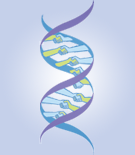User:Anna Marie Kenney: Difference between revisions
| Line 4: | Line 4: | ||
[[Image:OWWEmblem.png|thumb|right|Anna Marie Kenney (an artistic interpretation)]] | [[Image:OWWEmblem.png|thumb|right|Anna Marie Kenney (an artistic interpretation)]] | ||
Anna Marie Kenney | |||
* | *Associate Professor | ||
* | *Department of Pediatric Oncology, Winship Cancer Institute and Center for Children's Neuroscience Research | ||
Emory University | |||
* | *1760 Haygood Dr NE, Lab E397 | ||
Atlanta, GA | |||
*[[Special:Emailuser/Anna Marie Kenney|anna.kenney@emory.edu]] | |||
Future effective brain cancer treatments will be those that target molecules specifically affecting tumor growth, thereby avoiding all the devastating side effects of current treatments such as surgery, radiation and chemotherapy. To identify growth regulators that could be attacked by anti-tumor strategies, we must understand how cell division occurs in cells that give rise to brain tumors. In adults, neural stem cells have been identified as a source of brain tumors. The childhood brain tumor medulloblastoma develops from immature cells in the cerebellum, the part of the brain coordinating movement. A protein called "Sonic hedgehog" (Shh) is involved in proliferation of neural stem cells and developing cerebellar neurons. Medulloblastomas are the most common solid pediatric malignant tumors. These tumors arise in young | |||
children from dividing progenitor cells in the cerebellum. Current treatments for medulloblastoma—surgery, | |||
cranio-spinal radiation, and chemotherapy—leave survivors with life-long, devastating side effects. Moreover, | |||
medulloblastoma recurrence and metastasis are lethal. Development of new medulloblastoma therapies that | |||
are less debilitating and more effective has been hampered by poor understanding of the molecular and cell | |||
biological events causing the tumors and promoting their recurrence and metastasis. Greater insight into how | |||
genes and proteins regulate proliferation in cerebellar progenitor cells, and how their dys-regulation contributes | |||
to tumorigenesis, will identify targets for new therapies that can specifically affect tumor growth without | |||
damaging the still-developing brain. | |||
==Education== | ==Education== | ||
Revision as of 10:34, 21 August 2013
I am a new member of OpenWetWare!
Contact Info

Anna Marie Kenney
- Associate Professor
- Department of Pediatric Oncology, Winship Cancer Institute and Center for Children's Neuroscience Research
Emory University
- 1760 Haygood Dr NE, Lab E397
Atlanta, GA
Future effective brain cancer treatments will be those that target molecules specifically affecting tumor growth, thereby avoiding all the devastating side effects of current treatments such as surgery, radiation and chemotherapy. To identify growth regulators that could be attacked by anti-tumor strategies, we must understand how cell division occurs in cells that give rise to brain tumors. In adults, neural stem cells have been identified as a source of brain tumors. The childhood brain tumor medulloblastoma develops from immature cells in the cerebellum, the part of the brain coordinating movement. A protein called "Sonic hedgehog" (Shh) is involved in proliferation of neural stem cells and developing cerebellar neurons. Medulloblastomas are the most common solid pediatric malignant tumors. These tumors arise in young children from dividing progenitor cells in the cerebellum. Current treatments for medulloblastoma—surgery, cranio-spinal radiation, and chemotherapy—leave survivors with life-long, devastating side effects. Moreover, medulloblastoma recurrence and metastasis are lethal. Development of new medulloblastoma therapies that are less debilitating and more effective has been hampered by poor understanding of the molecular and cell biological events causing the tumors and promoting their recurrence and metastasis. Greater insight into how genes and proteins regulate proliferation in cerebellar progenitor cells, and how their dys-regulation contributes to tumorigenesis, will identify targets for new therapies that can specifically affect tumor growth without damaging the still-developing brain.
Education
- 1998-2003, Postdoc, Dana-Farber Cancer Institute/Harvard Medical
- 1998, PhD, Yale University, New Haven, Connecticut
- 1991, BA, St. Mary’s College, St. Mary’s City, Maryland
Research interests
- Interest 1
- Interest 2
- Interest 3
Publications
<biblio>
- Paper1 pmid=21297222
- Paper2 pmid=20935513
- Paper3 pmid=20890301
- Paper4 pmid=22407012
- Paper5 pmid=18755774
- Paper6 pmid=21339731
- Paper7 pmid=20081363
- Paper8 pmid=21051932
- Paper9 pmid=19738049
- Paper10 pmid=22302101
// leave a comment about a paper here